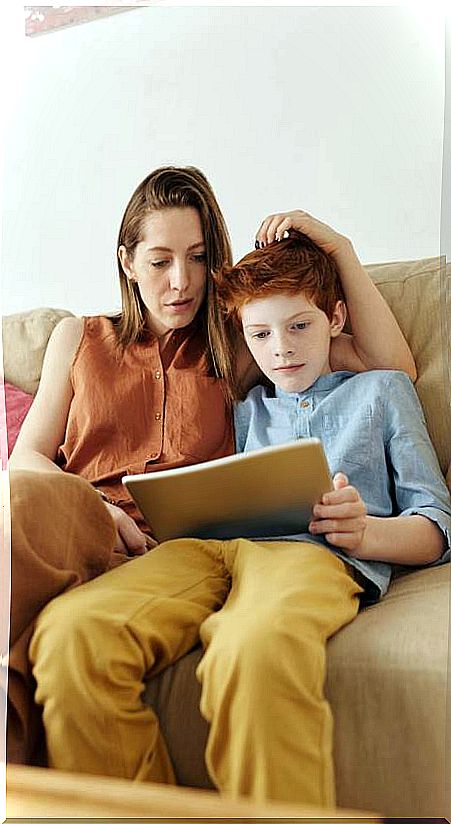7 Films Recommended By Psychologists To Watch With Children
Two health psychologists specialized in child psychology, Julio A. Rodríguez and Yolanda A. Alén, have prepared a selection of 7 films for children and explain why what can help them emotionally. They are titles that speak about solidarity, empathy or personal struggle.

The children have had to face an unusual confined season. Mental health experts suggest that one of the things we parents can do for their psycho-emotional well-being is to spend more time with them during this vacation. Watching a movie with the family is a good option for a summer afternoon. According to psychologists and pedagogues, if we choose the film well, it can be a great opportunity to transmit educational messages and to promote dialogue and exchange of opinions between parents and children.
Two health psychologists specialized in child psychology, Julio A. Rodríguez and Yolanda A. Alén, head of the Con Psicología cabinet, have prepared a selection of 7 films for children and have explained why they are suitable. All of them deal with important issues of emotional development, such as solidarity, empathy or personal struggle. “Many of them are values that the smallest of the house have understood and internalized during these hard and different months of their lives,” says Yolanda.
Educating children in values is the best task that can be done with them: “It prepares them for the future and gives them responsibility and autonomy. Sharing spaces of the day with them is the best time invested with a view to their correct and complete social, psychological and affective development. Watching movies with them not only educates, it also entertains and amuses. Something essential for the child ”, explains the psychologist Julio A. Rodríguez.
Movies to watch with children this summer 2020
- Inside Out (Inside Out) (Recommended for children over 7 years old)
It can be considered the “Our Father” of emotions. One of the films that best allows us to explain and value emotions with children, making them easily acceptable. It teaches that there are emotions and it is not necessary to catalog them. It also shows the importance of sadness, the emotion that we always try to repress, ignoring that it is necessary and useful. Memories and experiences are also valued.
- My Neighbor Totoro (For children over 5 years old)
It is a Japanese animated film by Studio Ghibli. With it, parents and children learn. Parents can recover that emotion and illusion that is the adventure of each day, since the film indicates the change when leaving the environment of the city and getting lost in nature, the connection with the environment and freedom. For children, it involves learning how to find good things after a bad start. It also conveys the message that different beings that we might see as “monsters” can be exceptional creatures.
A clear teaching centered on love, help and respect for nature is extracted.
The psychologist Julio A. Rodríguez emphasizes that this film is for very young children. However, he recommends versions for later ages such as Spirited Away, which talks about consumerism and the loss of childhood. And also Princess Mononoke , which deals with feminism, with the control and active role of women and the criticism of consumer society.
- Coco (For children 7 years and older)
It is a kind way to bring children closer to the idea of death, the value for life, family and respect for the elderly. With this tape we can stop to assess how appearances are confusing and that self-confidence is paramount. The idea that the truth cannot be hidden is rescued and gives meaning to our lives, that it is important to fight for dreams and it is necessary to learn to forgive and not give up.
- Ice Age (For children from 3 years)
By following the examples of the characters of Manny and Diego, we can learn to confront the opinion of others, without being carried away by it, as long as we trust that we do the right thing. The film shows the importance of friendship, generosity, care, sacrifice and help. And precisely the differences make the protagonists learn and overcome, supporting and protecting each other. The word “team” and what it implies makes sense.
- Billy Elliot (Recommended for children over 13 years old)
It allows us to explore the absurdity of prejudices, the importance of effort, overcoming or the knowledge of frustration. It is a film that invites us to talk with children about what their dreams are and the essentials of fighting and accompanying them in the process to achieve them. In addition, there is an underlying importance of appreciation for those who remain there, not only family but also friends. And, above all, the film reflects that you must never stop being yourself.
- Champions (For children over 7 years old)
It is a Spanish production that speaks of inclusion and improvement, showing that we can all learn from everyone. It is a film to value differences, not as defects, but as options to perceive the world. It teaches to appreciate the path, personal growth and not just achievements. The film crew manages to capture the innocence and naturalness of those who intervene and the message is human. There is an attempt to sensitize the public with people who are often not heard. Sports practice is also highlighted as the protagonist, providing the vision of enjoyment and improvement, not exclusively of victory.
- Wonder (for children from 8 years old)
Although the book is a great option to take advantage of this summer, the film is not far behind. It is a good way to approach small issues such as bullying . The story moves away from excessively innocent idealism. The characters are wrong and thanks to that, they grow and mature. It fosters values such as empathy, tolerance, solidarity, compassion and the prevention of bullying. Many children with fears and insecurities will be reflected in the idea of the child who feels good in his private refuge, where others see him as special. It is a film that invites parents to discuss the reasons for certain decisions.









